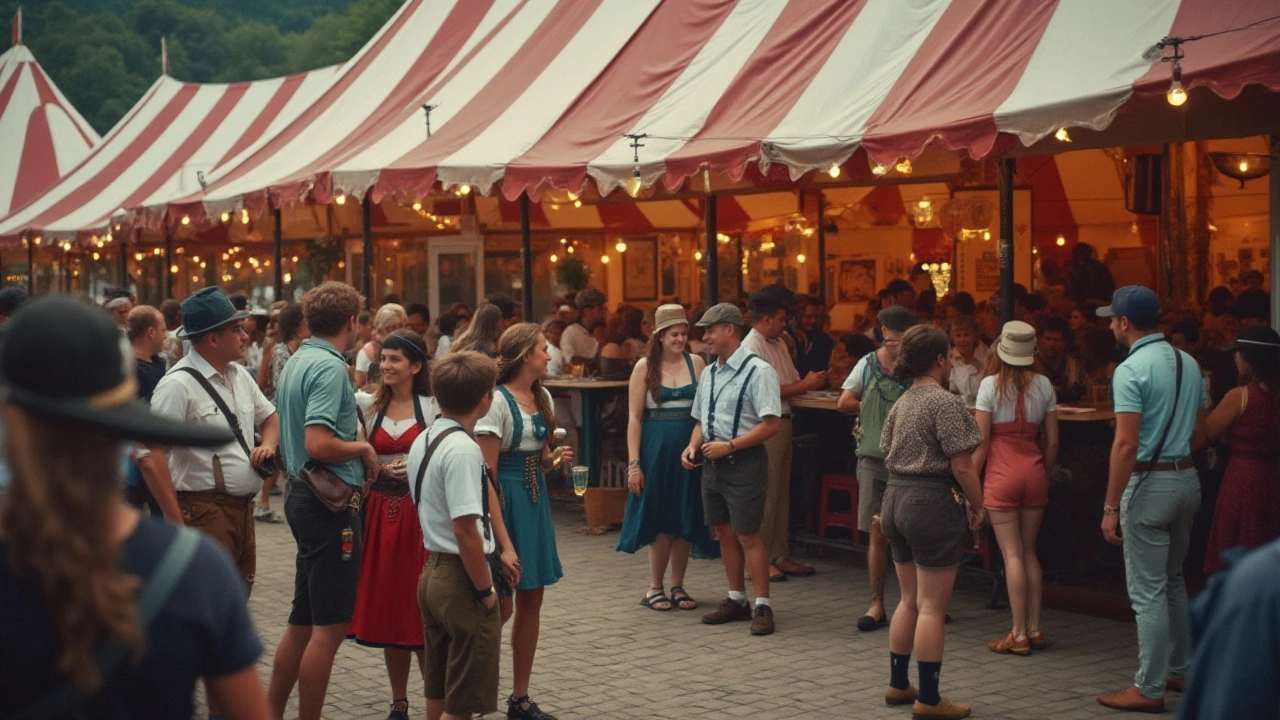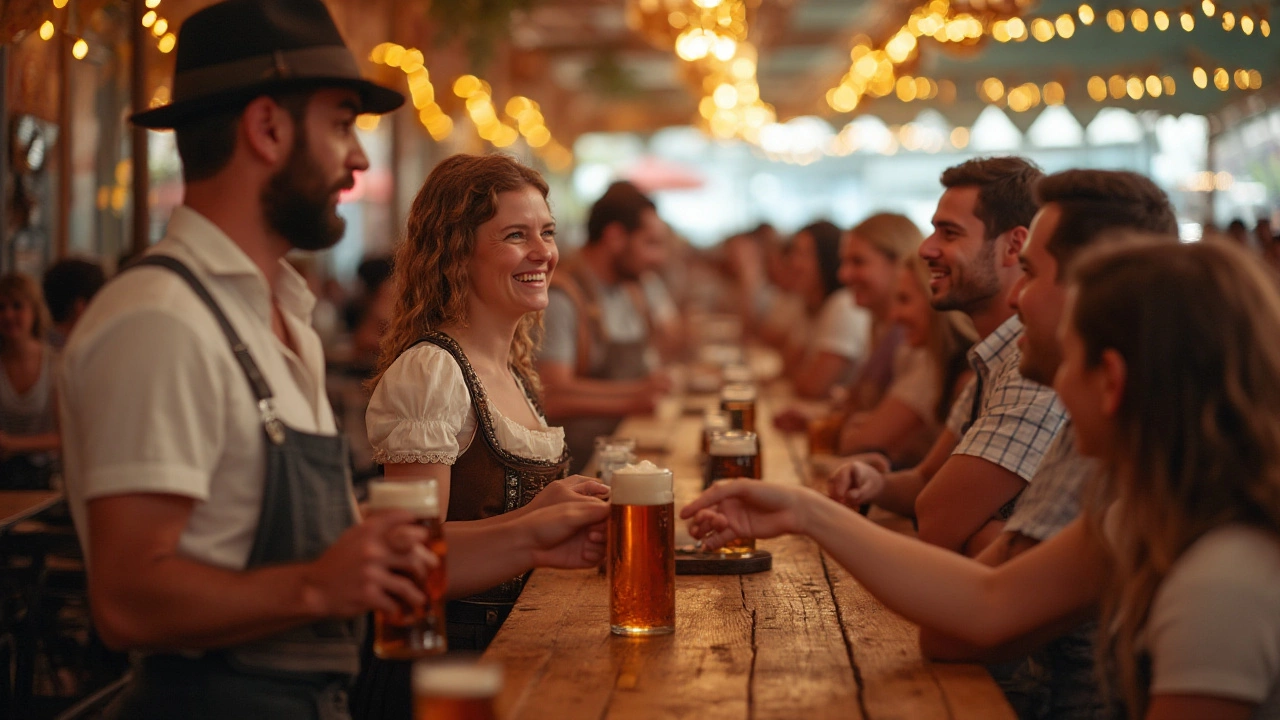When the leaves turn amber and Munich buzzes with excitement, you know it's time for Oktoberfest. This joyous celebration, founded over two centuries ago, isn't just about chugging down pints of the finest Bavarian beers; it's a vibrant tapestry of tradition, culture, and conviviality.
Yet, amidst the merriment, one question bubbles up like a foamy lager head—how much should you tip at Oktoberfest? While the beer tents echo with laughter and clinking mugs, understanding the subtleties of tipping can enhance your experience exponentially.
In this guide, let's tap into the heart of Oktoberfest's tipping culture, ensuring you’re not just another tourist but a well-informed guest respecting cherished traditions. Whether it's your first sip at a biergarten or a masterful Maß of your favorite brew, knowing when and how much to tip plays a crucial role in this festivity.
- Understanding Oktoberfest Tipping Customs
- Tipping Etiquette for Waitstaff
- How Tipping Influences the Experience
- Cultural Differences in Germany
- Practical Tips for First-Time Visitors
- Beyond Beer: Other Services to Tip
Understanding Oktoberfest Tipping Customs
When immersed in the wonders of Munich's Oktoberfest, it's easy to lose oneself in the infectious rhythm of accordions and the grandeur of lederhosen. However, as you clink your stein with newfound friends, a small but significant cultural practice lurks beneath the surface - tipping. While Germany is not a country where tipping is mandatory, it's a practice deeply appreciated, especially during global gatherings like this iconic beer festival. Tipping, or 'Trinkgeld' as the locals say, isn't merely about the exchange of money but a token of respect for the tireless effort put forth by the waitstaff.
The standard rule when it comes to tipping at Oktoberfest is to round up to the nearest euro. For instance, if your bill amounts to €13.50, it's a gracious act to hand over €15. Yet, there's a certain charm in offering a little more generosity—around 5% to 10% of the bill if the service has added a sparkle to your day. This isn't set in stone, but like a nod of appreciation, it ensures you remain in the good graces of those ferrying massive beer mugs through bustling crowds. These servers often juggle the weight of several liters while maintaining a cheerful disposition.
The tipping custom varies across different tents and regions, reflecting a broader German hospitality culture. Some tents might witness patrons leaving a few more coins with a nod of thanks, while others attract international visitors unfamiliar with the local practices. Engaging with waitstaff is not just a transactional affair. Many have stories worth listening to, often infused with local wit and charm that enrich the dining experience. As you navigate the rich tapestry of beer tents, knowing when and how much to tip not only eases your experience but also offers a glimpse into the complex weave of local customs.
In the words of Lisa McNally, renowned travel writer for the Bavarian Tourism Board, "Tipping at Oktoberfest isn't just about the numbers; it's a friendly gesture that bridges cultures and fosters a welcoming atmosphere amidst the joyous hustle."
For those new to the beer festival, it's crucial to remember that while tipping is appreciated, it's never obligatory. The spirit of Oktoberfest is rooted in jovial camaraderie, and the hosts intend for their guests to share exhilarating experiences, not stress about etiquettes. Nonetheless, a well-tipped server may just return with your beer a tad faster, adding a sprinkle of magic to your Oktoberfest story. Familiarizing yourself with these customs helps ensure not just a better service for you but also supports the hardworking men and women adding flavor to this colossal global celebration.
Tipping Etiquette for Waitstaff
Attending Munich's Oktoberfest is a delightful voyage into a world brimming with joyous laughter, hearty camaraderie, and the finest beers presented in traditional Maß mugs. Within this whirlwind of celebration, the waitstaff—clad in crisp lederhosen and dirndls—play a pivotal role in crafting your unforgettable fest experience. Their tireless commitment to delivering efficient service amidst clinking steins and spirited songs often goes unmentioned, yet it is their dedication that keeps the wheels turning smoothly.
As you revel in the enthusiasm of the festival, it's customary to tip for the service you receive. In Germany, tipping is not mandatory but is greatly appreciated as a token of gratitude for excellent service. When it comes to Oktoberfest, a standard practice is to round up your bill to the nearest euro or add approximately 5% to 10% of the total amount. For instance, if your bill is €18.50, rounding it to €20 including the tip, indicating your appreciation subtly yet effectively. Some seasoned festival-goers suggest that a generous tip might ensure faster service the next round—an inside tip that is worth its weight in gold when the tent heaves with exuberant crowds.
Understanding how to tip appropriately involves more than a mechanical calculation. It carries a cultural component that holds its roots deeply in German etiquette. While it might feel counterintuitive to those familiar with different systems, tipping at Oktoberfest doesn't need to be extravagant. The goal is to exhibit respect and appreciation, aligning with the local way of celebrating hospitality without going overboard.
To facilitate smooth transactions, it's also helpful to carry a decent amount of cash, as Oktoberfest transactions are predominantly cash-based. This helps you avoid last-minute scrambles for loose change in bustling beer tents. Many experienced attendees suggest keeping a handful of euros ready for swift exchanges, ensuring you don't hinder the lively pace by fumbling for coins.
"Tipping is not just about money—it’s a gesture of kindness and understanding," says a regular at the Theresienwiese, echoing sentiments common among locals and tourists alike.
In essence, knowing how much to tip reflects your sensitivity towards both the demanding nature of waitstaff roles and your sincerity as an appreciative guest. While numbers matter, willingness to acknowledge fine service speaks volumes—embracing this mindset could indeed turn your Oktoberfest from just another beer festival into a cherished memory to savor.

How Tipping Influences the Experience
Cracking the code of tipping at Munich's Oktoberfest might seem like a daunting task, yet it turns out to be more rewarding than just a mere social nicety. The heart of this festivity isn't just the hearty Bavarian brews but the camaraderie expressed through small gestures, like tipping, which play an instrumental role. It's a commonplace scenario—attendees are drawn out of their seats, engaging in lively conversations and establishing connections with people from all walks of life. Tipping is a way to give back to those who make this revelry possible, particularly the waitstaff, who work tirelessly amidst the ever-present revelry.
In a festival that can attract upwards of 6 million visitors annually, prompt and friendly service does not merely happen by chance. Waitstaff are incentivized by these little acts of appreciation, ensuring you never find your glass empty for too long. A typical tip might range from 10% to 15%, subtly nudging the notion of gratitude. While some might argue that merely paying the bill suffices, the essence of tipping highlights a deeper cultural appreciation on both sides. Visitors quickly learn that extending a tip isn't just a transaction—it's part of the Oktoberfest experience that solidifies your unofficial membership into this universal exchange of mirth.
"I like to believe that tipping at Oktoberfest exemplifies the spirit of 'Gemütlichkeit,' a term encompassing warmth, friendliness, and good cheer," noted Franz Meyer, a veteran Oktoberfest host and author of several best-selling books on German culture.
The impact of tipping becomes even more pronounced as it directly affects the service you receive in those bustling beer tents. With a generous tip, you signal a desire for further rounds, personalized service, or even securing better seating arrangements when it's least expected. The indirect consequence? Tipping shapes the duration and nature of your experience, aligning incoming rounds of beer with seamless fluidity and shared laughter. Insightful patrons are quick to share that dependable, attentive service isn't just wished for—it's reciprocally earned.
Additionally, keeping the tipping practice alive bolsters local incomes, uplifting the very communities that host such grand ceremonies. It's important to understand that while tipping isn't enforced by law in Germany, quintessential practices gently nudge it into tradition. For seasoned attendees, tipping is no trivial subject; partaking in this custom is akin to participating in an age-old tradition where the bonds of goodwill are fortified over clinking steins. Through this delicate balance, the overall atmosphere of Oktoberfest effortlessly transforms, providing an indelible sense of local culture and hospitality that transcends language barriers.
So, next time you raise a glass at Oktoberfest, remember that your tip doesn't just fill a pocket; it enriches a tapestry of experiences that linger long after the final toast. While the cup may be the reason you're gathered, the gestures exchanged bear witness to the unity brought forth by shared enjoyment—an extraordinary quality that defines Oktoberfest's essence.
Cultural Differences in Germany
Immersing yourself in the magic of Oktoberfest is not just about savoring the thrill of the festival; it's also a window into Germany's rich tapestry of culture. Each nation has its ways and traditions, and Germany is no different. Tipping—what locals call "Trinkgeld"—is deeply rooted in German culture, but it dances to a different tune than in other parts of the world. While in some countries, like the United States, tipping can sometimes seem obligatory and overwhelming, Germany follows a simpler, more pragmatic approach.
At Oktoberfest, understanding these nuances helps greatly in blending in and respecting local customs. In Munich, waitstaff, or "Kellner", who diligently serve at the bustling beer tents, greatly appreciate tips, but expect them within reason. Typically, rounding up to the nearest euro, or giving around 5-10% of the total bill, will show you appreciate their service. What's fascinating is how the tipping process unfolds. Unlike the rush of tossing money on the table, Germans often engage in a direct exchange, adding a layer of personal connection to the act.
Tipping at Oktoberfest isn’t just about the financial gesture; it's also a mark of appreciation for the efforts amidst the chaos and crowds. Without a doubt, the tip is seen as a reflection of gratitude rather than an enticement or bribery. Germans hold a notorious pride in their work ethic, and this cultural ethos seeps into their festival norms, where a smile and a sincere "Danke schön" (thank you) often accompany the tip.
From a broader perspective, the significance of tipping extends beyond monetary value. Visitors tapping into this era-old practice at Oktoberfest get a chance to genuinely connect with the Bavarian culture. Though it might feel slightly different from home, embracing it offers a more authentic experience in this global celebration. If you're curious about a unique take on the tipping culture at Oktoberfest, noted travel writer Rick Steves once remarked, "In Germany, a little gesture goes a long way, especially if accompanied by a heartfelt expression of thanks."
Indeed, being aware of cultural differences helps make the festival richer and more rewarding. It makes the difference between being just another outsider who visited Munich during those magical weeks in autumn and someone who's absorbed its ethos with respect and admiration. And while you're sipping that fine Maß of beer in lively camaraderie, remember that embracing these cultural subtleties creates a connection that transcends the mere act of tipping.

Practical Tips for First-Time Visitors
Stepping into the lively world of Munich's Oktoberfest for the first time can feel both exhilarating and overwhelming. With the aroma of pretzels and bratwurst wafting through the air, large beer tents adorned in vibrant colors, and traditional Bavarian music in every corner, the experience is nothing short of a sensory feast. To navigate this bustling event, a few practical tips can help you make the most of your visit without any hiccups. First and foremost, arrive early, especially on weekends. The festival tends to get crowded, with local and international tourists flocking to grab a spot in the popular beer tents. Securing a table early in the day means you'll have the best choice of seating. Remember, some tents have reservation systems, so checking these ahead of time might save you a hassle.
Aside from logistics, understanding the unspoken rules around tipping can make your interactions smoother. Germans generally appreciate tipping under the table in cash when possible. As you sip your brew and enjoy the atmosphere, keep in mind that the service staff, who carry those hefty steins with incredible dexterity, rely significantly on tips. It's customary to tip around 5-10% of your bill. For those large Maß (liter-sized beers), you might slip an extra euro or two directly to your server, especially when you're receiving prompt service. It's not just about the money; acknowledging their hard work can go a long way. Another point of consideration: credit cards aren’t universally accepted here, so carrying adequate cash is wise.
Besides the titular beer, Oktoberfest offers a cultural journey through food, music, and traditional attire. Visitors often wonder about donning lederhosen or dirndls – the classic Bavarian outfits. Besides being a fun way to immerse yourself in the festivities, it's a nod of respect to local traditions. Renting these costumes is an affordable option for newcomers, available in several shops around Munich. Beyond the clothing, it's worth exploring the festival's other offerings. Each tent has unique specialties and vibes, from chicken roasteries to cider houses. Venturing beyond beer tents reveals fairground rides, traditional dance shows, and parades, broadening your Oktoberfest experience.
"When at Oktoberfest, try to blend in by embracing local cultures, whether it's through your attire, food, or even an attempt at speaking a few German phrases," advises travel expert Rick Steves.
For many, the memories made at Oktoberfest extend beyond the festival grounds. Around Munich, there are beautiful historical sites and charming neighborhoods worth exploring. Engaging with the locals, whether in a friendly conversation or sharing a communal table, often leads to hearing fascinating anecdotes or receiving insider tips on hidden gems in the city. Though Oktoberfest is nominally a beer festival, it encompasses the spirit of German hospitality and community. Above all, approach the festival with a sense of curiosity and respect, and you're bound to leave with wonderful stories to tell.
Beyond Beer: Other Services to Tip
Oktoberfest is a sensory overload in the best way possible. Once you've got your head around the tipping guidelines for beer, it's important to remember that there's more to this fest than just the drinking. Beneath the twinkling lights of the Ferris wheel and the bustling beer tents, a variety of services await your attention and appreciation. Tipping isn't just reserved for the beer servers; it's also a part of the broader experience here, touching on services that make the festival run smoothly. Indeed, showing gratitude can elevate your experience and make you memorable to locals and service providers.
Let's start with another facet of Oktoberfest that often goes under the radar until you require it—the cloakroom attendants and restroom service staff. A small tip of €1 to €2 can go a long way in expressing your gratitude. After all, these workers ensure that your belongings are safe while you frolic around the festival grounds. Tipping them, especially during peak times, can brighten their day and ensure you receive attentive service. Remember, a well-timed tip often translates into the smooth, efficient service you'd want at such a vibrant event.
Then there are the performers—those vivid costumed musicians and entertainers who infuse Oktorberfest with life and laughter. At times, they might pass a hat around, or there could be a designated space where you can drop a few euros as a token of appreciation. These folks aren't paid solely on the intensity of their accordion squeezes; your contributions add significantly to their income and encourage them to keep the spirits high. Like musicians at a local pub, it's customary and generous to occasionally acknowledge their efforts.
"Sharing even a modest tip with entertainers helps keep the cultural spirit of Oktoberfest alive," observes Anna Schmitz, a festival regular and cultural enthusiast.
After swaying to their tunes, you might decide to purchase some memorabilia. Should you stumble across a stall of handcrafted souvenirs or mementos, a small tip might not be customary, but a thoughtful gesture when someone has been particularly helpful. It signifies that personal touch often valued by artisans who thrive on interaction with visitors. Additionally, taxi drivers and transportation personnel can often be appreciative of a few extra euros, especially after navigating the complex maze of festival goers and ensuring you reach your destination safely.
Don't Forget the Restaurants and Food Stalls
Beyond the beer tents, Oktoberfest features numerous food stalls and small restaurants offering mouthwatering local cuisine. The aroma of sausages, pretzels, and roasted nuts is nearly impossible to resist. While it's not compulsory, leaving a small tip of around 5-10% is a kind gesture for staff who tirelessly keep the grills hot and the food coming. Efficient service in these bustling environments is invaluable, and rewarding a prompt and friendly vendor makes them feel valued amid the chaos.
Understanding the culture of tipping beyond the beer tent is essential for a holistic Oktoberfest experience. Whether you're showing gratitude to cloakroom attendants, performers, or food vendors, kindness and generosity often amplify the magic of this annual festivity. By tipping those who work tirelessly behind the scenes, you enhance not only your own experience but also contribute to the traditions that make Oktoberfest such a beloved event worldwide.


